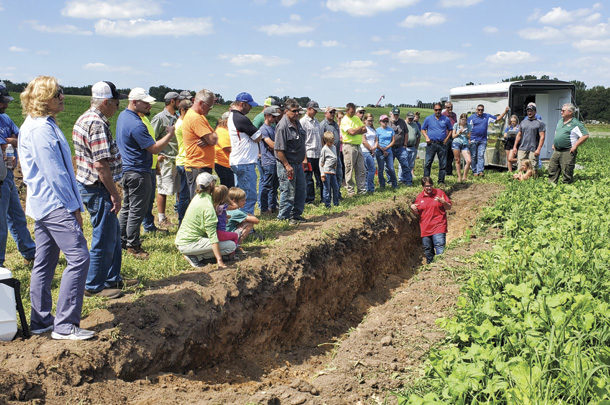Farmer-led conservation groups have been growing in popularity as a way for farmers to expand environmentally sound practices and document their progress.
These groups allow farmers to engage with each other, local experts and their communities as they work toward protecting and improving the environment. They foster innovation and shared learning among members to bring about continuous measurable improvements in areas such as water quality and soil health by exploring on-farm conservation practices.
All groups may do things a little differently, but there are five key themes to help ensure success.
1. Be clear about your goals
Identify your community’s specific concerns. Are there challenges with water quality? If so, is it phosphorus? Nitrogen? By getting granular about the issues, it will be easier to create a plan with specific actions for improvement. Develop a vision for the group to rally people around. Create specific, measurable goals and a work plan for the first year to help you stay on course.
2. Use your resources
There are lots of organizations and others you can learn from. No one is an expert in everything, and there is strength in collaboration. Reach out to others in your area who may be willing to help your group get organized and stay on track, whether it is your local extension agent, county conservationist or a non-profit organization. The Nature Conservancy, for example, has been an active participant in some groups.
Consult farmer leaders from other established organizations to get their perspective and advice on what they’ve seen as benefits and challenges. See if a local crop adviser is willing to be a guide for your group. Ask your banker if they are willing to help with financial management. If you need administrative support to keep everything organized, find someone to help. You might be surprised at the willingness of others to lend a hand.
3. Embrace data
You’ll need data to measure impact. First, develop a baseline because you won’t know if you’re making progress unless you document where you start. Then, track progress. A plethora of sustainability tracking tools are available. Work with a trusted adviser to select the method that works best for your goals and your members. Field to Market’s Fieldprint Platform and the Prioritize, Target and Measure Application (PTMApp) are two tools being used by farmer-led groups that Farmers for Sustainable Food works with for sustainability projects.
Make sure you continue to work with and rely on trusted advisers for interpreting results from the tools and for ideas on how to improve. It’s also important to make sure farmers are getting value from the data in the project by using it as a management tool to guide decisions for profitability and environmental improvements. Having someone help the group interpret the data ensures this will happen.
4. Find strong leaders
As with any organization, strong leadership is critical. Gather a group of diverse farmers who are local influencers and are passionate about addressing natural resource concerns. Share the work so it doesn’t all fall on one person. It takes considerable time, effort and energy to start an organization and even more to maintain it for the long term. Set the group up for success from day one by being intentional about who is at the table. This is also an opportunity to develop the next generation of leaders in your farm community.
5. Be transparent
Trust and credibility are built through transparency. This is true from the interactions between members of the group to supporters all the way through to the local community. Be up-front about your goals as well as your progress, and share them publicly. This can be done with aggregated, anonymized data about the group’s overall performance. Invite everyone to field days and spread the word about your group’s work with anyone who will listen. The more people who know farmers are doing their part to help with local concerns, the more trust you will foster.
If you want to dive into more specifics, check out the Producer-Led Group Roadmap developed by Farmers for Sustainable Food; the Wisconsin Department of Agriculture, Trade and Consumer Protection; and the Wisconsin Chapter of The Nature Conservancy at farmersforsustainablefood.com under the Projects & Resources tab.
Farmers for Sustainable Food, along with Grande Cheese and the Lafayette Ag Stewardship Alliance, were recognized with a 2021 Innovation Center for U.S. Dairy 2021 Sustainability Award for Outstanding Supply Chain Collaboration. They collaborated on a pilot project using a regional “milkshed” model, encompassing farmers, a processor, a brand and other partners coming together to develop a framework that answers sustainability questions raised from farm to table.
The partnership was featured in the July 1, 2021 issue of Progressive Dairy.






